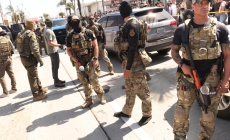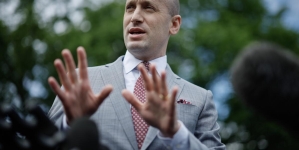-
David Gergen, Adviser to Presidents and Political Commentator, Dies at 83 - 6 hours ago
-
Federal judge temporarily halts alleged indiscriminate immigration stops - 11 hours ago
-
Coal, the Last Survivor of Canada’s Parliament Hill Cat Colony, Dies - 2 days ago
-
As Truth Social Business Struggles, Trump Media Goes Big on Crypto - July 9, 2025
-
Stephen Miller finally gets his revenge on L.A. - July 9, 2025
-
Trump Administration Acknowledges Lack of Evidence for Jeffrey Epstein ‘Client List’ - July 7, 2025
-
One of the Worst Industries in the World Gets Its Comeuppance - July 6, 2025
-
Hundreds rescued from rip currents off Newport Beach on July Fourth - July 5, 2025
-
Oasis Starts Its World Tour With Cardiff Concert - July 5, 2025
-
Supreme Court Agrees to Hear Cases Involving Transgender Athletes - July 3, 2025
Federal judge temporarily halts alleged indiscriminate immigration stops

A federal judge on Friday temporarily blocked the Trump administration from carrying out what advocates allege are unlawful stops and arrests that have terrorized Angelenos, forced some immigrants into hiding and damaged the local economy.
The ruling from U.S. District Judge Maame Ewusi-Mensah Frimpong, a Biden appointee, came after a hearing Thursday in a lawsuit filed on behalf of several immigrant rights groups, three immigrants picked up at a bus stop and two U.S. citizens, one whom was held despite showing agents his identification.
In her ruling, she said she found a sufficient amount of evidence that agents were stopping people based on their race, language, their vocation or the location they are at, such as Home Depot or a car wash, to form reasonable suspicion to stop someone for possible immigration law violations.
Frimpong said in her order that reliance on those factors — either alone or in combination — does not meet the requirements of the Fourth Amendment.
“What the federal government would have this Court believe in the face of a mountain of evidence presented in this case is that none of this is actually happening,” she said.
The judge ordered that federal agents cannot use those factors to establish reasonable suspicion, as required to detain people. And that all those in custody at B-18 must be given 24 hour access to lawyers and a confidential phone line.
The plaintiffs argued in their complaint immigration agents cornered brown-skinned people in Home Depot parking lots, at car washes and bus stops across Southern California in a show of force without establishing reasonable suspicion that they violated immigration laws. They allege agents didn’t identify themselves, as required under federal law, and made unlawful warrantless arrests.
Once someone was in custody, the complaint argues, their constitutional rights were further violated by being held in a downtown detention facility known as B-18, in “deplorable” conditions without access to a lawyer, or regular food and water.
Frimpong firmly agreed with the plaintiffs, and said they were likely to succeed in trial.
Since June 6, immigration agents have arrested nearly 2,800 undocumented individuals according to data released by DHS on Tuesday. A Times analysis of arrest data from June 1 to 10 found that 69% of those arrested during that period had no criminal conviction and 58% had never been charged with a crime.
The sweeps have paralyzed parts of the city where high numbers of immigrants work.
Hours before the order was issued, Tom Homan, Trump’s chief advisor on border policy, responded to the tentative ruling, telling Fox News “If the judge makes a decision against what the officers are trained, against what the law is based upon,” he said that it would “shut down operations.”
He echoed government attorneys who argued that agents, in deciding whether to stop a person, can consider location, vocation, clothing, whether they run, and other factors.
“ICE officers and Border Patrol don’t need probable cause to walk up to somebody, briefly detain them, and question them,” he said. “They just need the totality of the circumstances.”
He said agents receive training on the Fourth Amendment every six months.
In an hours long hearing Thursday afternoon, Frimpong took issue with Justice Department attorney Sean Skedzielewski and his lack of specific evidence to refute accusations of indiscriminate targeting.
When he argued that “these are sophisticated operations” and seemed to say that arrests stemmed from particular people who were being targeted, she questioned how that could be true.
In other cases where local and federal law enforcement are targeting people for crimes, the judge pointed out, there are reports after an arrest “as to why they arrested this person, how they happened to be where they were and what they did.”
“There doesn’t seem to be anything like that here, which makes it difficult for the court to accept your description of what is happening, because there is no proof that that is what is happening as opposed to what the plaintiffs are saying is happening,” Frimpong said.
Skedzielewski argued the lack of evidence is why the court should not grant a temporary restraining order. The government, he argued, had only “a couple days” to try to identify individuals mentioned in the court filings.
“We just haven’t had a chance to identify in many cases who the people stopped even were, let alone — over a holiday weekend — get ahold of the agents,” he said.
Frimpong didn’t seem moved and questioned the government’s reliance on two high-ranking officials who have played a key role in the raids in Southern California: Kyle Harvick, a Border Patrol agent in charge of El Centro, and Andre Quinones, deputy field office director for Immigration and Customs Enforcement.
Their declarations, she said, were “very general” and “did not really engage with the pretty high volume of evidence that the plaintiffs have put in the record of the things we have all seen and heard on the news.”
“If there’s any one of these people and there was a report about ‘this is how we identified this tow yard, parking lot etc’ that would have been helpful,” Frimpong said. “It’s hard for the court to believe that in the time that you had, you couldn’t have done that.”
Skedzielewski said the evidence is replete with instances of stops, but “it is not replete with any evidence that those stops or that the agents in any way failed to follow the law.”
He said agents’ actions were “above board.”
Mohammad Tajsar, an attorney with the ACLU of Southern California, told the judge that agents cannot solely use a person’s workplace, their location or the particular work they’re doing as reason to stop people.
Tajsar added that it was because of the government’s “misunderstanding of the law” that they’d made so many stops of U.S. citizens, including Brian Gavidia, a named plaintiff who was detained by Border Patrol agents outside of a tow yard in Montebello.
Tajsar said Gavidia, who was present in the courtroom during the hearing, was stopped “for no other reason than the fact that he’s Latino and was working at a tow yard” in a predominantly Latino area.
“Because of this fundamental misunderstanding of the law from the government, we have seen so many unconstitutional and unlawful arrests,” Tajsar said.
Tajsar also pushed back on the government attorneys saying they didn’t have enough time, stating that “they had time and they have all the evidence.”
This week the city and county of Los Angeles — along with Pasadena, Montebello, Monterey Park, Santa Monica, Culver City, Pico Rivera and West Hollywood — sought to join the suit.
In their court filing, the cities and the county countered the raids haven’t actually been about immigration enforcement, rather they are politically driven “to make an example” of the region for “implementing policies that President Donald J. Trump dislikes.”
They cited Trump’s post on his social media platform where he calls on immigration officials to do “all in their power” to achieve “the single largest Mass Deportation Program in History” by expanding efforts to detain and deport people in Los Angeles and other cities that are “the core of Democrat power.”
U.S. Department of Justice attorneys argued the detentions were legal, and a judge should not grant any relief broadly.
“The government has a legitimate and significant interest in ensuring that immigration laws are enforced, and any limitation would severely infringe on the President’s Article II authority,” government lawyers wrote.
Source link







